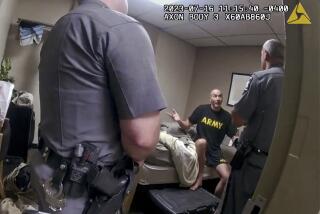The Tragic Age : Millions of Elderly Lose Their Freedom, Funds and Minds to Serious Confusion, Forgetfulness
The old man is in his 80s and looks the picture of health. His doctor says he will live another decade or more.
The doctor is better with hearts and arteries than he is with verbs. He should have said “exist.”
The old man, a widower, exists in the home his sweat has earned him. He is only partially aware of it now, although he looks outside and sees the baby grapefruit on the trees under the Southwestern sun and says there are a lot of grapefruit on the trees. He will say it again and again in the next hour before it passes from the short loop of his memory.
He bought the home for peace and retirement. Since his wife died of cancer some years ago, he has lived there with his daughter. It is a nice home.
He spends his days watching television, sometimes without seeing and sometimes thinking the events are real, happening right there in the den.
His children have come to think of him as a child, having known him as a man. Just as a child is such a pleasure, accumulating one by one the building blocks of self, their father sits there in the same place every day, losing himself block by block.
There are perhaps 3 million to 4 million Americans who suffer from 100 or so ailments characterized by serious confusion and forgetfulness, says the National Institute on Aging. They used to call it senility; now, for about 60%, they call it Alzheimer’s disease. Another 20% are the victims of many small strokes. None of the conditions are reversible.
In most instances, these Americans are doomed to losing their freedom, their independence, their minds. They face impoverishment to provide for their basic care.
Their children, unless they are very well off, face a great deal of personal expense, guilt and emotional turmoil, the kind that tears families apart.
The old man was once possessed of a rare vitality and, to use a word from his generation, spunk. He was smart. He was loving. He was charming. He bluffed his way into law school and did well until they discovered he had not finished the eighth grade.
He was a salesman extraordinaire . He sold gas refrigerators and ranges, life insurance, fruits and vegetables. At various times he owned and ran a cocktail lounge, a restaurant, a ballroom in the late 1920s, a supermarket, a children’s clothing store, a candy factory, a dress factory and, finally, an art gallery, although he knew precious little about art at the beginning.
A friend once visited the gallery and asked him how, after selling material things all of his life, he could sell something as esoteric and personal as art.
“Well,” he said, “I sit here and watch when customers come in, and when they stop in front of a painting and start nodding, I stand next to them and start nodding too.”
“In Alzheimer’s disease, changes in the nerve cells of the outer layer of the brain result in the death of a large number of cells. . . . Persons suspected of having Alzheimer’s disease or multi-infarct dementia (a series of small strokes) should have thorough physical, neurological and psychiatric examinations. . .
“If the diagnosis is one of the irreversible disorders, there is still much that can be done to treat the patient and to help the family cope.”
--From the “Age Page”
National Institute on Aging
The old man was driving in Los Angeles when he suddenly lost control, jumped a curb and hit several parked cars. Luckily no one was hurt. It was the last time he drove.
It was difficult getting him to give up the keys. For months he would say he was going to the store and search his pockets for the non-existent keys.
“You can’t drive, Daddy,” his daughter would explain each time. “Why?” the old man would ask. “Because the doctor said you can’t. It’s too dangerous.” “What does he expect of me?” the old man would ask over and over.
“It is generally accepted that there are changes in some intellectual functions in the elderly just as there is some loss in physical abilities with aging. Normal aging, however, does not include gross intellectual impairment, confusion, depression, hallucinations or delusions. Such symptoms are due to disease and indicate the need for diagnosis and treatment.
“Estimates are that approximately 10% of persons older than 65 years have clinically important intellectual impairment.”
--From “Senility Reconsidered”
Journal of American Medical Assn.
The old man has trouble with words. His speech is clear, but he seems to forget what he is saying in the middle of a sentence, as if someone dug a ditch across his idea. When that happens, his face contorts with frustration, and, in the end, he will wring his hands and say, “I don’t know. I don’t know.”
He used to be an avid reader of mysteries and Westerns. The bookcases are full of Erle Stanley Gardner and Zane Gray and Louis L’Amour. Now he watches a lot of television, but he cannot follow a plot.
“Early symptoms of dementia noted by relatives, employers or friends, and frequently by patients themselves, are failing attention, memory and declining mathematical ability. Errors of judgment, irritability, personality changes, loss of a sense of humor or poor orientation may indicate to those around the patient that intellectual function is progressively deteriorating.”
--Ibid.
When he was younger, the old man was a whiz at ordinary mathematics and could not understand why his son had trouble with arithmetic. He had learned his lessons with cash, not academic tables.
He used to carry half a dozen pens in his shirt pocket and a wad of bills in his right-hand pants pocket. His daughter now hides the pens because they ruin his shirts with ink blots. He does not seem to miss them, although he still reaches for one if someone asks.
There was an argument over the money, but he no longer carries any. His son said it would do no harm to let him carry a few singles, mimicking the bankroll he once had, from which he used to peel off a five or a 10 for a grandchild. The daughter argued that he was giving it to the maids or the women who sat with him. Practicality won over token self-esteem.
“America’s elderly are at risk. Recent attempts to cast the elderly as ‘well-off’ belie the fact that as a group the elderly are more vulnerable to chronic, disabling diseases than their young counterparts. This added health risk comes with a hefty price--rising out-of-pocket costs for health and long-term care.”
--From a report by
House Select Committee on Aging
When the the old man was diagnosed as an Alzheimer’s victim, the son and daughter began their own study of the disease. It became apparent that there was nothing to be done except to make his life as comfortable as possible.
The old man’s own father had suffered from dementia many years ago and spent his 90s in a nursing home. The son and daughter would have to consider a similar course. They also have to consider that the problem might run in their long-lived family.
There is some evidence that Alzheimer’s disease is hereditary. Leonard Heston of the University of Minnesota has concluded that the earlier the onset of dementia, the more severe the course of the disease; the more severe the disease, the greater the frequency in family members.
Researchers are looking hard at a variety of possible causes for Alzheimer’s--chemical and enzymatic imbalances in the brain, trace metals in the central nervous system and slow-acting viruses that might destroy brain tissue. Clinicians have claimed some success in raising the level of choline in the blood on the theory that it will help the body replace an essential nerve-transmitting chemical, acetylcholine, in the brain.
The old man used to go for walks after his heart attack. Doctor’s orders. But then he would walk farther and farther and forget the way home, and his daughter would have to get in the car and search him down.
A University of Michigan survey of Alzheimer families found that most cared for their relatives at home. Of those who had placed a relative in a long-term care institution, most had kept the patient at home as long as possible before taking the last resort.
“In what amounted to a tremendous outpouring of information, the responses told of the frustrations of obtaining a diagnosis; of patients losing jobs and, oftentimes, benefits before a diagnosis was established; of the guilt which tore families apart when certain decisions were made, and of victims as well as care-givers fighting off alcoholism and depression,” a National Institute on Aging report of the study says.
“As the primary source of care for those who suffer from dementia, the family bears most of the economic and emotional burden of the disease, which might otherwise fall on social institutions.”
After resisting the notion of a nursing home for the old man, the son finally realized the tremendous burden his sister was living with. She was almost as much a prisoner in her father’s house as her father was. There was no chance of carrying on a conversation. The old man began to exhibit some paranoid tendencies when he could not tune in on conversations between son and daughter. They would have to go into the bedroom or outside to talk.
The old man became suspicious of telephone calls, hallucinated dark presences in the backyard or in the living room. He became very confused at people’s comings and goings. He kept imagining that he had to go and shave just after he shaved, or that he needed a haircut after his hair had been cut.
In the supermarket, he would push the cart, but he would wander with it and insist on pulling things down from the shelves much like a child, things they did not need.
The one thing that remained unchanged was the old man’s love of babies and children. Wherever he saw one, in the market or on television, he would break into a great big grin and say, “Isn’t that cute.”
But in a restaurant with mirrored walls, he would see his son’s image and ask angrily who that stranger was at their table.
Clearly, a nursing home was called for, but the son and daughter found that the cheapest annual cost would be about $25,000, just as clearly outside of their resources. When they inquired about aid, they found that their father would have to spend first from his meager estate and then would have to relinquish all but 15% of his Social Security, and additional costs would be collected from the eventual sale of his home.
There are no hard figures, and few estimates, but based on the number of people in nursing homes, it seems reasonable that at least 100,000 American families a year have to make such a decision.
“Based on surveys of elderly living in the community in Massachusetts, 63% of elderly persons aged 66 and older living alone will impoverish themselves after only 13 weeks in a nursing home. For married couples 66 years and older, one out of three will become impoverished within 13 weeks if one spouse requires nursing home care.
“The financial risk of caring for an Alzheimer’s victim at home is also high. Survey data show that one of six married couples aged 66 and older risk impoverishment after 13 weeks of home care and half risk impoverishment after one year. The analysis of financial risk among the elderly in Massachusetts is illustrative of what is happening to the elderly across the country.”
--From report of
House Select Committee on Aging
A year ago or so, the old man was sitting with his son in the rich light of a Southern sunset, the vermilion and yellows making the browns and creams of the den into a precious place.
“This is a nice house,” the old man said. “I love this house.”
But then his face darkened. “But they are coming to take it away from me.”
“Who is, Dad?” his son asked.
“They are,” his father said flatly, waving his hand at the small world around him. “They come here, all the time, creeping around.”
“Nonsense, Dad, there’s no one around here. The doors are double-locked. No one can get in.”
The son did not say that the doors were double-locked to keep his father in, and he wondered if his father somehow knows, as one senses the coming of death, that one day he might be taken from the home he loves so well.
More to Read
Start your day right
Sign up for Essential California for news, features and recommendations from the L.A. Times and beyond in your inbox six days a week.
You may occasionally receive promotional content from the Los Angeles Times.






